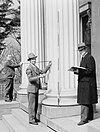File:CHAPEL, IN REAR OF CENTER SECTION. NOTE DOME. LOOKING NORTHWEST - U. S. Naval Asylum, Biddle Hall, Gray's Ferry Avenue, Philadelphia, Philadelphia County, PA HABS PA,51-PHILA,577A-8.tif

Original file (5,000 × 3,570 pixels, file size: 17.03 MB, MIME type: image/tiff)
Captions
Captions
Summary edit
| CHAPEL, IN REAR OF CENTER SECTION. NOTE DOME. LOOKING NORTHWEST - U. S. Naval Asylum, Biddle Hall, Gray's Ferry Avenue, Philadelphia, Philadelphia County, PA | |||||
|---|---|---|---|---|---|
| Photographer |
Related names:
|
||||
| Title |
CHAPEL, IN REAR OF CENTER SECTION. NOTE DOME. LOOKING NORTHWEST - U. S. Naval Asylum, Biddle Hall, Gray's Ferry Avenue, Philadelphia, Philadelphia County, PA |
||||
| Depicted place | Pennsylvania; Philadelphia County; Philadelphia | ||||
| Date | Documentation compiled after 1933 | ||||
| Dimensions | 5 x 7 in. | ||||
| Current location |
Library of Congress Prints and Photographs Division Washington, D.C. 20540 USA http://hdl.loc.gov/loc.pnp/pp.print |
||||
| Accession number |
HABS PA,51-PHILA,577A-8 |
||||
| Credit line |
|
||||
| Notes |
|
||||
| References |
|
||||
| Source | https://www.loc.gov/pictures/item/pa0668.photos.139237p | ||||
| Permission (Reusing this file) |
|
||||
| Object location | 39° 57′ 07.99″ N, 75° 09′ 51.01″ W | View this and other nearby images on: OpenStreetMap |
|---|
File history
Click on a date/time to view the file as it appeared at that time.
| Date/Time | Thumbnail | Dimensions | User | Comment | |
|---|---|---|---|---|---|
| current | 23:55, 2 August 2014 |  | 5,000 × 3,570 (17.03 MB) | Fæ (talk | contribs) | GWToolset: Creating mediafile for Fæ. HABS 2014-08-01 2601-2900 missing |
You cannot overwrite this file.
File usage on Commons
The following page uses this file:
File usage on other wikis
The following other wikis use this file:
- Usage on en.wikipedia.org
Metadata
This file contains additional information such as Exif metadata which may have been added by the digital camera, scanner, or software program used to create or digitize it. If the file has been modified from its original state, some details such as the timestamp may not fully reflect those of the original file. The timestamp is only as accurate as the clock in the camera, and it may be completely wrong.
| Author | Library of Congress |
|---|---|
| Width | 5,000 px |
| Height | 3,570 px |
| Compression scheme | Uncompressed |
| Pixel composition | Black and white (Black is 0) |
| Orientation | Normal |
| Number of components | 1 |
| Number of rows per strip | 13 |
| Horizontal resolution | 5,000 dpc |
| Vertical resolution | 3,570 dpc |
| Data arrangement | chunky format |
| File change date and time | 02:19, 26 August 1999 |

